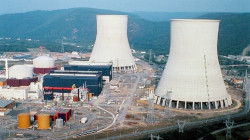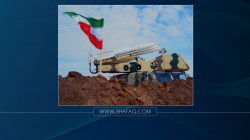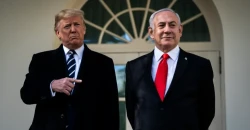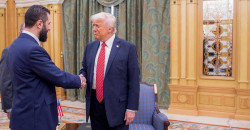Syria's shifting stance: Is normalization with Israel on the horizon?
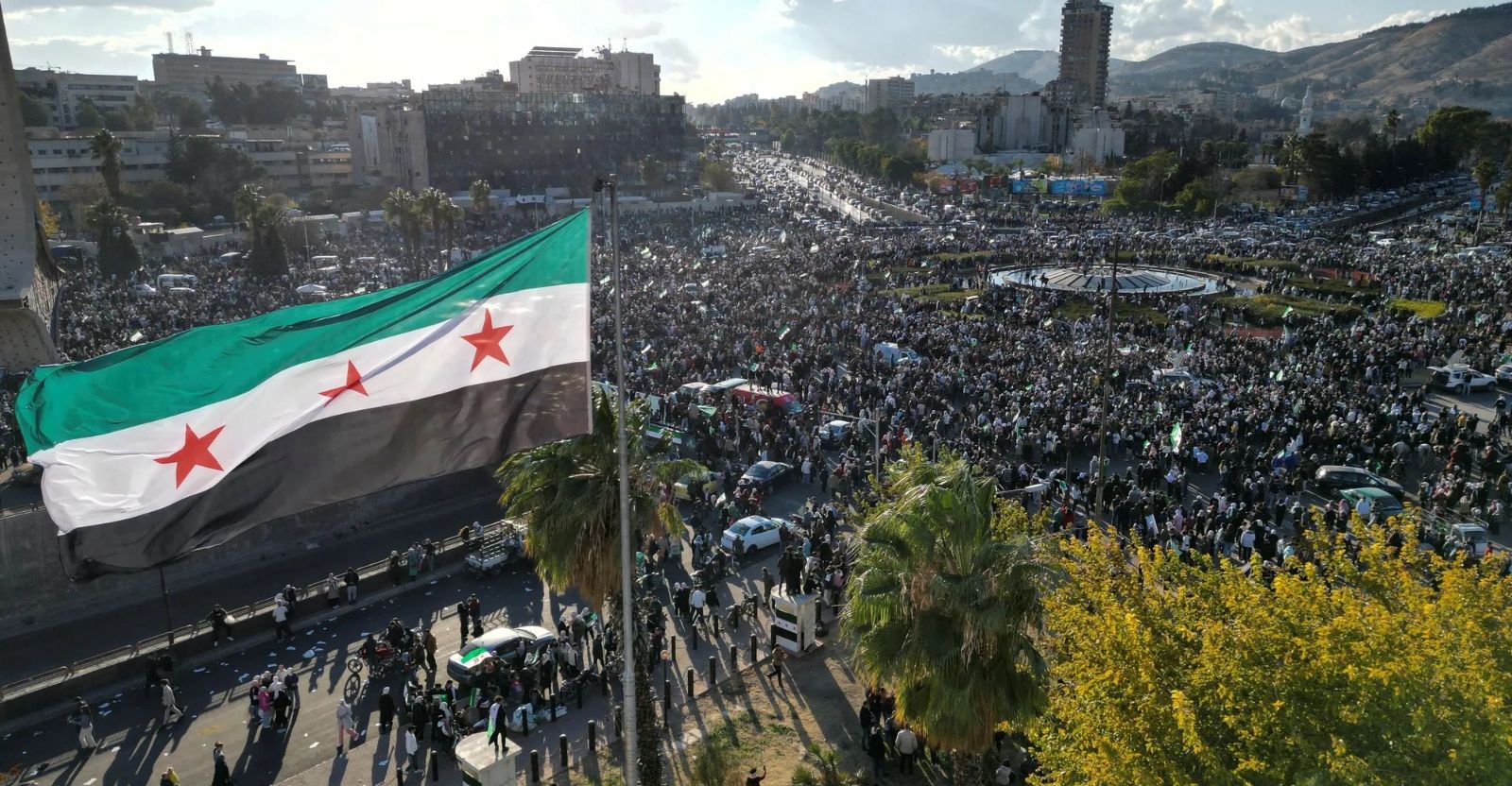
Shafaq News/ Syrian Transitional President Ahmad al-Sharaa has opened the door to the possibility of engaging with the Abraham Accords, a move that once seemed unimaginable.
Although al-Sharaa did not formally announce Syria’s intention to join the normalization agreements, a Bloomberg report revealed that during a 30-minute meeting with US Representative Cory Mills, he expressed openness under certain conditions. If these early signals turn into action, it would mark a major departure from Syria’s decades-long stance toward Israel.
Could this cautious step be the beginning of a political shift in the Middle East, where normalization between Syria and Israel was long thought impossible?
Decades of Hostility
Since the Baath Party seized power in Syria in 1963, the country has consistently viewed Israel as a primary adversary. The ideological commitment to Palestinian self-determination and pan-Arab solidarity has heavily shaped Damascus’ regional policies. For Syria, the creation of Israel in 1948 represented an act of colonial aggression against Arab lands, with the resulting displacement of Palestinians seen as both a moral and political catastrophe.
Syria has long supported Palestinian resistance groups, providing military and logistical assistance. It offered bases and training to factions such as the Popular Front for the Liberation of Palestine (PFLP) and other groups engaged in armed struggle against Israel. Additionally, Syria has backed Hezbollah in Lebanon, viewing the Shiite armed group as a vital partner in confronting Israeli occupation. This partnership became especially significant after Israel’s withdrawal from southern Lebanon in 2000, a move that followed Hezbollah’s prolonged resistance.
Beyond its ideological stance, Syria’s direct conflict with Israel has intensified the animosity between the two sides. After the 1967 Six-Day War, Israel occupied the Golan Heights, a strategically important plateau that overlooks both northern Israel and southwestern Syria.
Despite numerous United Nations resolutions affirming Syria’s sovereignty over the Golan, Israel effectively annexed the territory in 1981, a move largely rejected by the international community. However, in 2019, the United States, under President Donald Trump, recognized Israeli sovereignty over the Golan, a decision that further strained relations.
In the 1990s, there was a brief window of potential reconciliation. With the assistance of US mediation, particularly during the administration of President Bill Clinton, Syrian and Israeli negotiators engaged in several rounds of talks focused on the "land for peace" principle. This concept proposed the full return of the Golan Heights to Syria in exchange for a comprehensive peace agreement.
However, the negotiations ultimately broke down over unresolved issues. Disagreements persisted regarding the final border delineation and security arrangements, particularly Syria’s access to the northeastern shore of the Sea of Galilee.
At that time, Israeli Prime Minister Ehud Barak hesitated to meet Syria’s demands, fearing domestic political repercussions, while Syrian President Hafez al-Assad was unwilling to make concessions. As a result, the opportunity for a peace agreement was lost.
A New Era
The fall of Bashar al-Assad in December 2024 marked a pivotal shift in Syria’s political landscape, ending more than two decades of his rule and paving the way for new leadership under Ahmad al-Sharaa, better known as Abu Mohammad al-Jolani.
Al-Sharaa, a former leader of Hayat Tahrir al-Sham (HTS), emerged as the country’s new leader after an 11-day military offensive in which his forces captured several key cities, including Aleppo, Hama, Homs, and Damascus.
Once in power, al-Sharaa moved quickly to consolidate control, overseeing the adoption of an interim constitution that outlined a five-year transitional period.
The transitional government has also called for the lifting of international sanctions while reaffirming its commitment to a peaceful resolution of the Golan Heights dispute. However, officials have acknowledged the complex challenges ahead.
Syria’s new foreign policy has taken shape, with Foreign Minister Asaad al-Shibani stating, "Syria will not pose a threat to any country, including Israel." This carefully crafted message aims to reassure neighboring states, signaling a strategic shift towards de-escalation and regional stability.
Additionally, the new administration has curtailed the activities of Palestinian resistance factions previously operating from Syrian soil, dismantling long-established support networks.
Despite these overtures, Israel responded to the change in leadership with a marked escalation in military operations. Between late 2024 and early 2025, Israeli forces conducted over 2,400 airstrikes across Syria, targeting Syrian Army ammunition depots, air defense systems, and facilities associated with Iranian-backed groups. Israeli officials framed the campaign as necessary to prevent the transfer of weapons to Hezbollah and other allied factions.
Simultaneously, Israeli ground forces advanced 5 to 8 kilometers into Syrian territory along parts of the Golan Heights. The operation, described as the creation of a “security buffer” to protect Druze communities, resulted in the occupation of more than 120 square kilometers of Syrian land. This included rural areas surrounding al-Quneitra, the villages of Hadar and Khan Arnabah, as well as strategic hilltops near Tel al-Harra. The move, which violated the 1974 Disengagement Agreement, drew regional condemnation and raised concerns of a broader confrontation.
In response, Syria’s transitional government has exercised restraint, avoiding direct military confrontation or retaliatory rhetoric.
Post War Shifts
Normalization between Arab countries and Israel is no longer a novel development. The Abraham Accords, signed in 2020, opened a new chapter in regional diplomacy, breaking long-standing taboos and establishing a framework for broader Arab-Israeli engagement. Since then, several Gulf States have expanded ties with Israel, signalling a gradual but steady realignment across the Middle East.
The October 7, 2023, attacks and the ensuing war between Israel and Hamas further accelerated this momentum, reshaping the region’s balance of power. The conflict delivered significant setbacks to the broader "Axis of Resistance," weakening Palestinian factions, Hezbollah, and Iran, and leaving Syria increasingly isolated in the shifting landscape.
Faced with these changing dynamics, al-Sharaa has moved to distance Damascus from the beleaguered Axis. Seeking to rebuild strained ties with Arab neighbors, he positioned Syria closer to the emerging regional consensus, reflecting a broader recalibration of Syria’s foreign policy.
Against this backdrop, Emirati officials have reportedly urged Syria to formally consider joining the Abraham Accords during recent discussions. They presented normalization with Israel as a potential gateway to economic aid, foreign investment, and eventual political rehabilitation.
The prospect of Saudi Arabia finalizing a normalization deal with Israel — reportedly nearing completion — could further dismantle entrenched political taboos. A 2025 report by the Brookings Institution noted that such a breakthrough would likely pave the way for additional Arab states, including Syria, to follow suit without facing major domestic or regional backlash.
Economic pressures have added urgency to Damascus’s reassessment. United Nations estimates show that over 90% of Syrians now live below the poverty line, with inflation rates surpassing 130% in 2024, severely eroding purchasing power. Syria’s GDP has contracted by more than 60% since 2011, while reconstruction costs are projected to range between $400 billion and $500 billion.
Without foreign investment and relief from international sanctions, Syria’s economic collapse threatens to deepen, making normalization with Israel increasingly seen within al-Sharaa’s government as a potential lifeline for national recovery and regional reintegration.
A Cautionary Parallel
Syria’s current predicament mirrors Sudan’s experience in recent years. Once a strong supporter of Palestinian rights and a fierce opponent of Israel, Sudan shifted its stance in 2021 under economic pressure and US diplomacy. Khartoum joined the Abraham Accords, gaining partial debt relief and economic assistance. While normalization did not solve any of Sudan’s challenges, it marked a strategic recalibration.
Damascus now finds itself tempted by a similar path. The Trump administration, still influencing the Abraham Accords process, has called for faster expansion. President Donald Trump recently urged a quicker pace. Washington has set conditions for engagement with Damascus, including respect for human and women’s rights, and rebuilding relations with Israel and its neighbors.
However, significant barriers remain. Hostility toward Israel is deeply rooted in Syrian society, shaped by decades of conflict, occupation, and profound national trauma. The majority of Syrians remain firmly opposed to normalization, viewing any rapprochement with Israel as a betrayal of longstanding principles tied to national sovereignty and the Palestinian cause. This widespread sentiment has made public discussion of normalization politically sensitive, prompting influential figures to avoid making any public statements on the issue.
The Golan Heights remains a major sticking point. As Cory Mills told Bloomberg, Syria’s demand for the return of the Golan is a condition Israel is unlikely to meet without significant concessions.
Nevertheless, diplomatic contacts have reportedly increased behind closed doors, but formal normalization remains uncertain. Whether Syria will join the Abraham Accords or choose a more cautious approach depends on internal calculations and shifting geopolitical dynamics. As Representative Mills noted, "At one point, Germany and Japan were our enemies, but we have to move beyond this if we are to have stabilization." For Syria, moving beyond decades of enmity would mark a monumental shift.
In this context, will Syria’s leadership seize the opportunity to formally end the state of war with Israel, or is this merely a political maneuver to buy time before returning to traditional stances?

